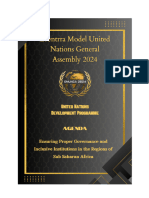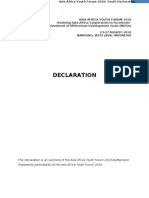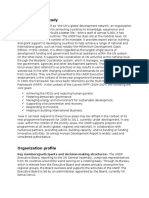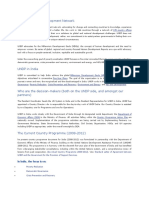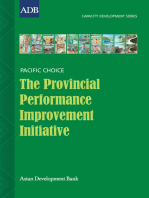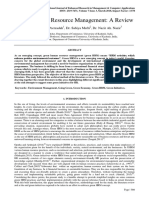UNDP Japan B
UNDP Japan B
Uploaded by
Frianta pangaribuanCopyright:
Available Formats
UNDP Japan B
UNDP Japan B
Uploaded by
Frianta pangaribuanOriginal Description:
Original Title
Copyright
Available Formats
Share this document
Did you find this document useful?
Is this content inappropriate?
Copyright:
Available Formats
UNDP Japan B
UNDP Japan B
Uploaded by
Frianta pangaribuanCopyright:
Available Formats
Delegation from Represented by
Japan Frankfurt School of Finance & Management
Position Paper for the United Nations Development Program
I. Enhancement of South-South Cooperation
Playing an important role in international efforts to increase economic growth in developing countries and
providing means and channels to implement a great number of Sustainable Development Goals (SDGs) in the
respective countries, the delegation of Japan recognizes South-South Cooperation (SSC) as an important pan-
national collaboration providing a platform of solidary liaison between Member States. Being the first developed
country to offer substantial and sustained support for SSC, Japan emphasizes goal 2 on food security, goal 7 on
energy needs and goal 17 on partnership; recalling the progress generated from SSC as stated in the report of the
Secretary-General Promotion of South-South cooperation for development: a thirty-year perspective (A/64/504).
The delegation of Japan further emphasizes the results of the Nairobi outcome document of the High-level United
Nations conference on South-South Cooperation as adopted by the General Assembly in A/RES/64/222. Not being
a nation of the Southern Hemisphere, Japan’s main role in the SSC is providing advice and funding in order to
give the countries coordinating under the SSC the required means to reach their goals in technical, social, political,
cultural and economic fields. Thus Japan supports southern partnerships with the capacities of the Japan
International Cooperation Agency (JICA). JICA assists Japan’s southern partners with complementary support to
technical cooperation among developing countries. JICA further is involved in SSC organizational capacity
development by providing experts to share their experience and practical approaches to planning and managing
cooperation activities and draw lessons learned. Sharing knowledge and experience will not only foster capacity
and management, it will also pave the way for technology to transfer and take place. Japan believes that assisting
the SSC through facilitating knowledge and experience within the cooperation will help contain food insecurity
within Member States by raising awareness to agriculture production, food production in terms of population
growth and threats of malnutrition. Therefore, Japan affirms the role of the UNOSSC Enabler, a number of internal
initiatives, such as: the Global South-South Development Academy (GSSD), the Global South-South Development
Expo (GSSD Expo), and the South-South Global Assets and Technology Exchange (SS-GATE) by the provision of
funds and expertise. Japan also believes that through aiding experience and knowledge sharing, developing nations
will help each other build solid economic foundations, which in return will strengthen self-reliance. A kind of aid
that results in development projects tailored to on-the-ground realities of the recipients and that overcome the
donor-recipient dichotomy. The delegation of Japan endorses the guidelines of the Buenos Aires Plan For Action
(BAPA) and further expresses its gratitude to governments of Member States in signing the Paris Climate
Agreement COP21 and aligning the cooperation’s development with the SDGs. Additionally, Japan recommends
the creation of Measurable, Reportable and Verifiable (MRV) Frameworks in response to the Bali Action Plan
(BAP) on a national and regional level, in order to create incentives for renewable energy companies and further
enhance PPPs. Japan, with its leading role in supporting multilateral projects, will moreover reaffirms its
commitment in finding solutions for development challenges, enhancing partnerships and achieve the SDGs.
II. Empowering Youth for Development
Japan recognizes the young people of this planet as always having been a major driving force behind prosperous
change. With 1.8 billion people being considered as young, there currently are more young people in the world
than ever before. The delegation of Japan believes that this generation has the potential to change this world into
a place where future generations enjoy inclusive education, sustainable economic growth, healthy lives, gender
equality and justice for all. Despite advancements in every aspect of life, one third of young people live in
countries experiencing everyday violence, 75 million are unemployed and even more lack empowerment in other
aspects of life, posing immense challenges for the International Community. The delegation of Japan regards these
challenges as highly urgent and calls upon the international community to show support for strengthening the
commitment of young people to become agents of sustainable development. Japan acknowledges the progress that
has already been made in international institutions such as the UN’s World Programme of Action for Youth (WPAY)
and the UNDP Youth Strategy 2014-2017, which both show the broad international recognition and strong
commitment towards this issue. The delegation of Japan appreciates the efforts made by Member States,
international intuitions and non-governmental organizations (NGOs) to develop joint programs aiming at
empowering youth in various areas, such as the cooperation between UNDP and United Nations Industrial
Development Organization (UNIDO) to provide young people with job opportunities through industrialization.
In constructive cooperation with the UNDP, Japan has demonstrated support towards youth empowerment
especially in areas of education and training as well as the creation of work opportunities in developing countries.
The Youth Employment Generation Programme in Arab Transition Countries Jordan Component is a cooperation
between the local Japanese Embassy, the UNDP and the government of Jordan and gives young people better
opportunities on the labor market by jointly addressing coordinated project management, creation of internship
and job opportunities in private companies and youth employment generation policies on a national level. Due to
the universal nature of these projects when it comes to locations and thematic subjects, these integrative
approaches show great potential for future youth empowering projects. Therefore, the delegation of Japan
proposes the creation of a pan-national and pan-institutional program strengthening the role of the world’s youth
in development by empowering them in the areas of education and training, economic prospects, socio-cultural
positioning, political representation and proper access to health care. The baseline of such a program would be
establishing a coordinative agency under the leadership of the UNDP to actively contribute to the topic of youth
empowerment involving international organizations and related NGOs. In 2005 Japan launched the UN Decade
of Education for Sustainable Development (DESD), reinitiating the program at the 2014 "UNESCO World
Conference on ESD”, emphasizing the role of education in empowering youth. Additionally, Japan recognizes the
United Nations Security Council resolution S/RES/2250 of 2015 and believes that by giving the young people of
this world the means to care for their own subsistence and make their voices heard in society as well as politics
they can actively contribute to worldwide development and progress. Therefore, Japan calls upon Member States
to dedicate their expertise and aid to assist dialogues within conflicted areas in order to promote social cohesion
and include both women and youth in the process of decision making. Furthermore, Japan endorses the ILO's
Youth Employment Programme and considers it a part of the proposed program. Moreover, Japan recommends
Member States to pave the way for the creation of Civil Society Organizations (CSOs). Japan believes that the
proposed approach will help to make projects more efficient as they can be conducted on a pan-organizational
basis. It is further open for input from CSRs and national or regional governmental bodies while still having an
independent supervision. The delegation of Japan recalls the importance of pan-agency cooperation and is
convinced that the agency proposed will contribute to youth empowerment by effectively utilizing every
organization’s individual area of expertise.
III. Ensuring Women’s and Men’s Equal Participation in Democratic Governance and Peacebuilding
The delegation of Japan recognizes that gender equality and women empowerment are important development
goals, both being listed in the SDGs as well as in the Millennium Development Goals (MDGs). Moreover, Japan
emphasizes the growing importance of goal 16 from the SDGs; the promotion of inclusive and peaceful societies,
the provision of justice for all and the buildup of inclusive, effective and accountable institutions. While
democracy becomes tendentious within transitional states, the role of women in democratic governance and
peacebuilding seems yet vulnerable. The delegation of Japan recognizes the synergy between the role of women
and democratic governance and peacebuilding, a major pillar of economic, political, and social growth. Hence,
Japan has initiated and completed its National Action Plan (NAP) in response to the United Nations Security
Council (UNSC) resolution 1325 of 2000. In accordance with the Beijing Platform of Action (BPA) declaration
in 1995, Japan has established the Japan Women in Development Fund (JWIDF) in order to promote women
empowerment through innovative projects that generate knowledge and experience which would be used for
further development activities and development policy. Despite the impediments in implementation of the Beijing
Declaration and Platform for Action and other relevant resolutions, Japan has expressed its commitment by
consistently identifying and taking action on said challenges. Parallel to national policies, Japan vitally addresses
women empowerment on an international level, where it has ratified the Fifth Periodic Report of Parties of 2002
(CEDAW/C/JPN/5) of the Convention on the Elimination of All Forms of Discrimination against Women. Japan
believes that gender equality and women empowerment will foster democratic inclusiveness and thus, pave the
way for democratic governance and peacebuilding in all of conflict and post-conflict communities. Moreover, on
September 12th 2014, Japan endorsed the role of women, by initiating the World Assembly for Women (WAW)
initiative, inviting about 100 national and international leaders aiming to realize a “Society Where All Women Can
Shine” in Japan and in the rest of the world and emphasizes the cooperation between the private and public sectors
towards women’s active social and political participation. Additionally, Japan has committed itself to ensure the
enforcement of laws and punishment regarding sexual assaults in order to eliminate all kind of violence against
women. Japan is a major donor in financing the United Nations Team of Experts (ToE) on the Rule of Law and
Sexual Violence in Conflict. This Team of Experts provides technical assistance to governments in conflict and
post-conflict communities by strengthening their capacity. Japan supports governments, NGOs and other
community organizations with training and information in order to promote women’s equal participation to local
communities. The delegation of Japan urges Member States to comply with resolution 1889 of 2009, which
emphasizes the need to develop effective financial and institutional arrangements, reaffirming women’s
participation in peacebuilding throughout post-conflict communities. Upon response to this resolution, Japan
recommends the creation of a comprehensive policy-making think-tank, in collaboration with national
governments, where significant information and data-collection could be provided to advise peacebuilding and
national dialogues. Our delegation reminds Member States that access to justice is only attained through inclusion
of women in democratic decision-making. Thus, Japan calls upon Member States to work closely with United
Nations Multidimensional Integrated Stabilization Mission (MINUSCA) in order to coordinate aid, achieve social
cohesion and community resilience in all vulnerable, conflicted and post-conflict states.
You might also like
- Green Port Award System Annual Report 2023Document10 pagesGreen Port Award System Annual Report 2023Noli Nusog100% (1)
- Philippine Youth Development Plan 2017-2022Document150 pagesPhilippine Youth Development Plan 2017-2022Kamille Ruiz100% (5)
- World Conference On Education For All: Meeting Basic Learning NeedsDocument129 pagesWorld Conference On Education For All: Meeting Basic Learning NeedsTs. Dr. Zulkifli Mohd SidiNo ratings yet
- Leading Green Practice Test 2 - Answer KeyDocument50 pagesLeading Green Practice Test 2 - Answer KeyMarwan Omar100% (1)
- Japan ODADocument11 pagesJapan ODAshikharv90No ratings yet
- UNDP ProposalDocument59 pagesUNDP Proposaljatinmakwana09No ratings yet
- Investing in Youth Volunteers To Foster Social Cohesion and PeacebuildingDocument2 pagesInvesting in Youth Volunteers To Foster Social Cohesion and PeacebuildingErmi SusilowatiNo ratings yet
- United Nations Development Assistance Framework: (Undaf) Lao PDRDocument53 pagesUnited Nations Development Assistance Framework: (Undaf) Lao PDRSantisoukNo ratings yet
- Undp Study Guide - Emunga 24 (1) GGMDocument35 pagesUndp Study Guide - Emunga 24 (1) GGMspectator8998No ratings yet
- Japan's International Cooperation: (Development Cooperation and Response To Global Issues)Document28 pagesJapan's International Cooperation: (Development Cooperation and Response To Global Issues)RAmNo ratings yet
- What Is UNDP? / IntroductionDocument3 pagesWhat Is UNDP? / Introductionprati pNo ratings yet
- Boys and Girls in EthiopiaDocument130 pagesBoys and Girls in EthiopiaMark Ebrahim100% (1)
- UNDP For BeginnersDocument25 pagesUNDP For BeginnersjoayalNo ratings yet
- FF Poverty ReductionDocument2 pagesFF Poverty ReductionIsraelo ChavezNo ratings yet
- Description of Assignment: T. F. A. WDocument8 pagesDescription of Assignment: T. F. A. WsudumanikamanjuNo ratings yet
- YPD Guide Executive Summary PDFDocument2 pagesYPD Guide Executive Summary PDFAlex FarrowNo ratings yet
- Declaration AAYF 2010Document8 pagesDeclaration AAYF 2010Chandarasy TithNo ratings yet
- Philippines 2024Document2 pagesPhilippines 2024rizzalyn.alinsasaguinNo ratings yet
- African Development Bank: Economic Research Working Paper SeriesDocument30 pagesAfrican Development Bank: Economic Research Working Paper SeriesZ_Z_Z_ZNo ratings yet
- National Youth Commission PYDP - FINALDocument140 pagesNational Youth Commission PYDP - FINALrodmagat100% (2)
- Indonesian Youth in The 21st Century (Youth Mapping) PDFDocument86 pagesIndonesian Youth in The 21st Century (Youth Mapping) PDFNikita DewayaniNo ratings yet
- 17th African Union Summit: Accelerating Youth Empowerment For Sustainable DevelopmentDocument6 pages17th African Union Summit: Accelerating Youth Empowerment For Sustainable DevelopmentNewAfricaNo ratings yet
- Ghana's National Youth Policy (Original Document)Document33 pagesGhana's National Youth Policy (Original Document)Golda AddoNo ratings yet
- From Dependency to Sustainability: A Case Study on the Economic Capacity Development of the Ok Tedi Mine-area CommunityFrom EverandFrom Dependency to Sustainability: A Case Study on the Economic Capacity Development of the Ok Tedi Mine-area CommunityNo ratings yet
- Position Paper - AditiMishraDocument2 pagesPosition Paper - AditiMishraaditim1308No ratings yet
- EmpowermentDocument11 pagesEmpowerment601026No ratings yet
- Youth in The Green EconomyDocument43 pagesYouth in The Green EconomyduycksNo ratings yet
- Human Capacity Building and Sustainable Development in The 21st Century: Implications and Challenges in NigeriaDocument8 pagesHuman Capacity Building and Sustainable Development in The 21st Century: Implications and Challenges in NigeriaIOSRjournalNo ratings yet
- ICFP Youth Advocacy Briefing NoteDocument13 pagesICFP Youth Advocacy Briefing NoteKristen NallanNo ratings yet
- UNDPDocument27 pagesUNDPJishnu GopinathNo ratings yet
- Significance of StudyDocument8 pagesSignificance of StudyChahatBhattiAliNo ratings yet
- Koreas Knowledge Sharing ProgramDocument16 pagesKoreas Knowledge Sharing ProgramKhangBomNo ratings yet
- Commonwealth Youth PogrammeDocument44 pagesCommonwealth Youth PogrammeGolam KibreaNo ratings yet
- The Role of Private Higher Education Institutions in Sustainable DevDocument27 pagesThe Role of Private Higher Education Institutions in Sustainable DevShakthi BharatheeNo ratings yet
- Project End Report - 2020Document18 pagesProject End Report - 2020karishma nairNo ratings yet
- vn-Integrated-financing-framework-ENG UN Women 2022Document36 pagesvn-Integrated-financing-framework-ENG UN Women 2022Le TamNo ratings yet
- The UN's Global Development Network: in India, The Focus Is OnDocument5 pagesThe UN's Global Development Network: in India, The Focus Is OnNancy DsouzaNo ratings yet
- Building Capacity through Participation: Nauru National Sustainable Development StrategyFrom EverandBuilding Capacity through Participation: Nauru National Sustainable Development StrategyNo ratings yet
- Annual Report 2015 2016Document78 pagesAnnual Report 2015 2016seaze420No ratings yet
- Gimao PPPlastDocument8 pagesGimao PPPlastJuan Carlo CastanedaNo ratings yet
- Why Is Aid To Developing Countries So Important Right Now?Document2 pagesWhy Is Aid To Developing Countries So Important Right Now?Marlon Flavier TagordaNo ratings yet
- Ethio-CoP-MfDR-Concept Note June 2010 Version 2nd DraftDocument12 pagesEthio-CoP-MfDR-Concept Note June 2010 Version 2nd DrafttamiratyacobchultacNo ratings yet
- SA1 - Miranda, Dannielle Zand'teDocument9 pagesSA1 - Miranda, Dannielle Zand'teDannielle Zand'te MirandaNo ratings yet
- Changing Mindsets To Realize The 2030 Agenda For Sustainable DevelopmentDocument180 pagesChanging Mindsets To Realize The 2030 Agenda For Sustainable DevelopmentMatthew Louise CelisNo ratings yet
- UNESCO Activities in JapanDocument6 pagesUNESCO Activities in JapanAlejandro MartinezNo ratings yet
- UNV Youth Volunteering Strategy 2014-2017, Empowering Youth Through VolunteerismDocument13 pagesUNV Youth Volunteering Strategy 2014-2017, Empowering Youth Through VolunteerismUnited Nations VolunteersNo ratings yet
- A New Vision for the Health Sector in Tonga: Change and Capacity Development StrategiesFrom EverandA New Vision for the Health Sector in Tonga: Change and Capacity Development StrategiesNo ratings yet
- UN Women - Budget Call Circulars and Gender Budget Statements in The Asia PacificDocument58 pagesUN Women - Budget Call Circulars and Gender Budget Statements in The Asia PacificA N Y ANo ratings yet
- APYE BookletDocument17 pagesAPYE BookletMelva PasaribuNo ratings yet
- Angono IloDocument73 pagesAngono IloAnsel Guillien Gatulayao SamsonNo ratings yet
- Jennifer Complete ProjectDocument77 pagesJennifer Complete ProjectdannygreatcomedyNo ratings yet
- UNDP - United States - B PDFDocument2 pagesUNDP - United States - B PDFFrianta pangaribuanNo ratings yet
- Uganda Human Development Report 2015Document180 pagesUganda Human Development Report 2015jadwongscribdNo ratings yet
- Reflection Paper: Youth Policy Formulation Manual Summary:: Page - 1Document8 pagesReflection Paper: Youth Policy Formulation Manual Summary:: Page - 1Juan Carlo CastanedaNo ratings yet
- Resolution Policies Programmes YouthDocument4 pagesResolution Policies Programmes YouthAfonso RibeiroNo ratings yet
- Rwanda 2005 National Youth Policy PDFDocument36 pagesRwanda 2005 National Youth Policy PDFIrawan SaptonoNo ratings yet
- Bridging the State-Society Gap: The Community Justice Liaison Unit of Papua New GuineaFrom EverandBridging the State-Society Gap: The Community Justice Liaison Unit of Papua New GuineaNo ratings yet
- 2012-2013 UNDP Annual Report: Supporting Global ProgressDocument44 pages2012-2013 UNDP Annual Report: Supporting Global ProgressUNDP TürkiyeNo ratings yet
- Unicef Annual Report 2010Document24 pagesUnicef Annual Report 2010Alisya PutriNo ratings yet
- Youth Empowerment As Catalyst For Sustainable Development in NigeriaDocument18 pagesYouth Empowerment As Catalyst For Sustainable Development in NigeriaSamuel AdesojiNo ratings yet
- The Provincial Performance Improvement Initiative: Papua New Guinea: A Case Study on Subnational Capacity DevelopmentFrom EverandThe Provincial Performance Improvement Initiative: Papua New Guinea: A Case Study on Subnational Capacity DevelopmentNo ratings yet
- AUTO - Annual Report 2019 PDFDocument332 pagesAUTO - Annual Report 2019 PDFFrianta pangaribuanNo ratings yet
- 31 Enrichment Even 2020 Track Study Abroad Info SessionDocument76 pages31 Enrichment Even 2020 Track Study Abroad Info SessionFrianta pangaribuanNo ratings yet
- SOAP Bible Reading GuideDocument18 pagesSOAP Bible Reading GuideFrianta pangaribuanNo ratings yet
- Frianta A PangaribuanDocument3 pagesFrianta A PangaribuanFrianta pangaribuanNo ratings yet
- UNDP - United States - B PDFDocument2 pagesUNDP - United States - B PDFFrianta pangaribuanNo ratings yet
- Asia Youth International Model United Nation 2018: State University of MedanDocument3 pagesAsia Youth International Model United Nation 2018: State University of MedanFrianta pangaribuanNo ratings yet
- Frianta A Pangaribuan: Listening Section Reading SectionDocument1 pageFrianta A Pangaribuan: Listening Section Reading SectionFrianta pangaribuanNo ratings yet
- Real Estate Investment Dissertation TopicsDocument7 pagesReal Estate Investment Dissertation TopicsProfessionalPaperWritingServiceVirginiaBeach100% (1)
- Wwind MillDocument35 pagesWwind MillRaja ManeNo ratings yet
- Unit 11 - Sustainable ConstructionDocument21 pagesUnit 11 - Sustainable ConstructionpuseletsoNo ratings yet
- Bridge 14 JSC - Profile PDFDocument13 pagesBridge 14 JSC - Profile PDFTàiChínhDoanhNghiệpNo ratings yet
- UNDP Strategic Plan 2022-2025Document16 pagesUNDP Strategic Plan 2022-2025Ana ValeraNo ratings yet
- Monte South Byculla BrochureDocument43 pagesMonte South Byculla BrochureNdaNo ratings yet
- Position Paper FormatDocument3 pagesPosition Paper Formatainabayhon7No ratings yet
- 2018 - Green Human Resource Management - A ReviewDocument6 pages2018 - Green Human Resource Management - A ReviewHussni100% (1)
- 3 Leading in A Culture of Change Chapter 2 Moral Purpose (Fullan)Document13 pages3 Leading in A Culture of Change Chapter 2 Moral Purpose (Fullan)Amy JacksonNo ratings yet
- 3 - Booklet On Science and Technology 1Document22 pages3 - Booklet On Science and Technology 1Ranbir Singh DahiyaNo ratings yet
- SustainabilityDocument37 pagesSustainabilityMarcin OsieckiNo ratings yet
- Value Ethics Module 2Document7 pagesValue Ethics Module 2Mayal SheikhNo ratings yet
- Strenghtening Civil Society - Phase TwoDocument10 pagesStrenghtening Civil Society - Phase TwoAsose TuNo ratings yet
- Cities Responding To Climate Change Copenhagen, Stockholm and Tokyo by Stephen JonesDocument303 pagesCities Responding To Climate Change Copenhagen, Stockholm and Tokyo by Stephen JonesDusan VeljkovicNo ratings yet
- Green Initiatives and Sustainability of Itc LTD NewDocument6 pagesGreen Initiatives and Sustainability of Itc LTD NewAiswarya Johny RCBSNo ratings yet
- Philippine Social RealitiesDocument18 pagesPhilippine Social RealitiesJessa Mea Goyha Germata100% (1)
- Sustainable Tourism Development - Guiding Principles For Planning and ManagementDocument10 pagesSustainable Tourism Development - Guiding Principles For Planning and ManagementNEOINFORMATION100% (1)
- Pepsico Stakeholder EngagementDocument15 pagesPepsico Stakeholder EngagementDr Kennedy Amadi.PhD0% (2)
- Agriculture Concept NoteDocument7 pagesAgriculture Concept NoteMohammad Asif Abedi75% (4)
- Market Research PDFDocument31 pagesMarket Research PDFAbu BindongNo ratings yet
- Right To Wholesome EnvironmentDocument7 pagesRight To Wholesome EnvironmentVanshika GaurNo ratings yet
- Incredible IndiaDocument88 pagesIncredible IndiaAlarkan PoothencheryNo ratings yet
- HEINEKEN Supplier Code v3.0 - 04022019Document7 pagesHEINEKEN Supplier Code v3.0 - 04022019ganiaguswaraNo ratings yet
- Terefe Mattu University 2022 Resaerch SummisionDocument69 pagesTerefe Mattu University 2022 Resaerch SummisionTerefe MegersaNo ratings yet
- Bulletin: International Council Traditional MusicDocument35 pagesBulletin: International Council Traditional MusicMladen MarkovicNo ratings yet
- Hul Annual Report 2017 18 - tcm1255 523195 - enDocument184 pagesHul Annual Report 2017 18 - tcm1255 523195 - enArnav ChakrabortyNo ratings yet
- Jammu and Kashmir Water Resources (Regulation and Management) ACT, 2010Document108 pagesJammu and Kashmir Water Resources (Regulation and Management) ACT, 2010SAJADNo ratings yet








